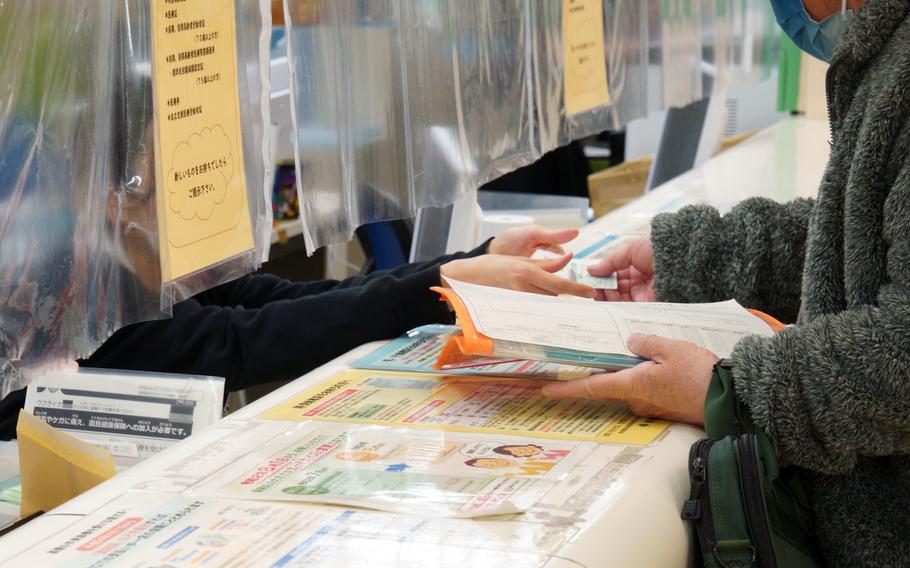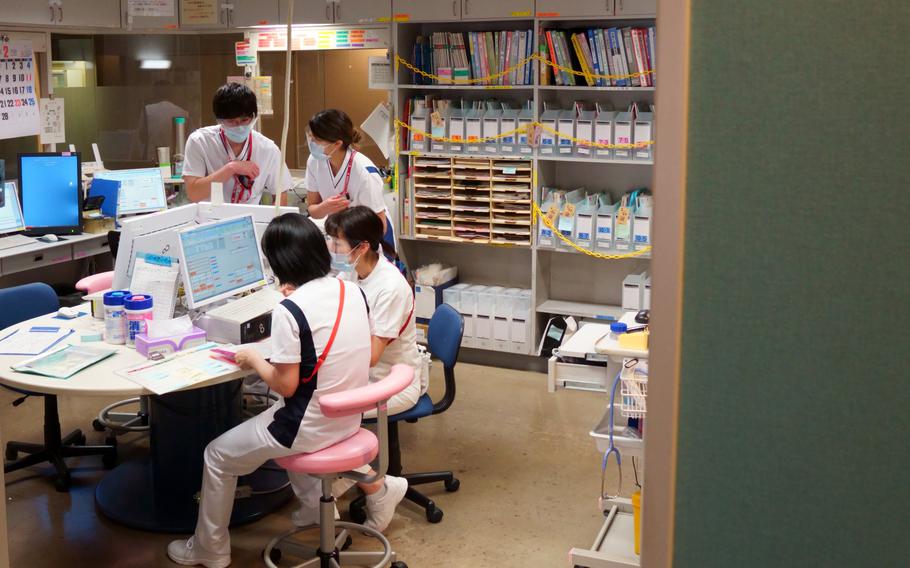
A patient visits Tokyo Metropolitan Hiroo Hospital in the city's Shibuya district, Feb. 21, 2023. (Akifumi Ishikawa/Stars and Stripes)
TOKYO — Civilian Defense Department workers seeking medical treatment in Japan may find Japanese hospitals easy to navigate with some planning, according to professionals at a Tokyo facility.
Since Jan. 1, the Defense Health Agency has limited DOD civilians to space-available appointments at base hospitals in the Indo-Pacific after higher priority patients, including service members, their families and some retirees, are scheduled.
The number of appointment slots available on short notice each morning varies. For example, Naval Hospital Yokosuka had 45 open on March 7 across several clinics, but none the following day.
DHA’s Indo-Pacific director, Army Maj. Gen. Joseph Heck, told DOD civilians in Japan to look for care in their Japanese communities. But health care advocates say obstacles in the Japanese system complicate the picture for Americans, including language barriers, time constraints, upfront payment and even denial of care in an emergency.
U.S. civilians who prepare for those obstacles will have an easier time navigating the Japanese system, staff from Tokyo Metropolitan Hiroo Hospital in Shibuya recently told Stars and Stripes.
Language barriers are the most obvious concern, said Takahiro Hatano, head of Hiroo’s medical professional section.
“Staff at our hospital generally don’t correspond in English; they mainly speak Japanese,” he said at the hospital on Feb. 21. “So, in that sense, we feel that there is a big language barrier.”
Some staff, however, do speak English, and the hospital employs full-time English and Chinese translators. Staff members also have interpreting tools such as a handheld translator and, during certain hours, an online translation service.
Planning ahead
Patients seeking care at a hospital or clinic in Japan are generally required to make an appointment for non-emergency treatment and to plan “plenty of time” for their visit, Hatano said.
“We see patients on a reservation basis, but there are times when other patients’ exam times take longer and keep others waiting,” he said.
Hiroo, like many hospitals in Japan, provides specialized medical care, so patients are advised to visit a local clinic first for a referral, according to Hatano.
Japanese hospitals and clinics prescribe medicine, but patients are generally required to visit a pharmacy. Prescriptions in Japan aren’t filed electronically, unlike in the United States, and patients have up to four days before their prescription is void, said Sonoyo Shioji, head of Hiroo’s pharmaceutical section.
Hiroo offers a list of nearby pharmacies with staff who speak English, he added.
American patients should be aware that certain medications are not commonly prescribed, or are sometimes prohibited, including drugs common in the U.S. such as Adderall or Xanax.
“Basically, the medicines that can’t be used are those that are prohibited to import, such as stimulants or cannabis,” Shioji said.
However, hospitals typically have a committee that may help DOD civilians obtain prohibited medications if the medicine is necessary or no substitute is available.

American patients should be aware that certain medications are not commonly prescribed, or are sometimes prohibited, in Japan, including common drugs such as Adderall and Xanax. (Akifumi Ishikawa/Stars and Stripes)
Denied care
A stark difference between the U.S. and Japanese health care systems is that Japanese hospitals can deny care, even in an emergency.
In 2020, 12,998 patients picked up by ambulances were refused admission to at least three hospitals, according to Japan’s Fire and Disaster Management Agency. Of those, 379 were turned away from more than 10 facilities; one patient was turned away from 116 hospitals.
“This is a difficult problem, but this may be an issue not just for one hospital like us, but rather an issue for the medical system as a whole,” Hatano said. “We have organized a system to accept patients transported by ambulance as much as possible.”
Some COVID-19 restrictions still in place bar emergency patients from certain areas inside hospitals, and a lack of staff or beds also detract from care.
“There are times when we are asked to accept emergency patients when we are already dealing with another, or when we don’t have necessary beds or when there are no specialized doctors,” Hatano said.
Upfront payment
Japanese health care facilities generally expect DOD civilians to pay up front for medical care. Those without Japanese health insurance are billed according to an open-ended point system. However, costs may vary between hospitals and U.S. patients may be met by large bills.
Hiroo expects patients to pay up front, though some may be exempt from paying the full amount, depending on their insurance providers.
Patients may call ahead and ask the hospital for an estimate of its fees, Hatano said, emphasizing that the estimate may not reflect the final bill.
For questions about importing medicines, patients can visit https://www.mhlw.go.jp/english/policy/health-medical/pharmaceuticals/01.html.
For a complete list of controlled or prohibited substances, visit https://www.ncd.mhlw.go.jp/dl_data/keitai/list.pdf.